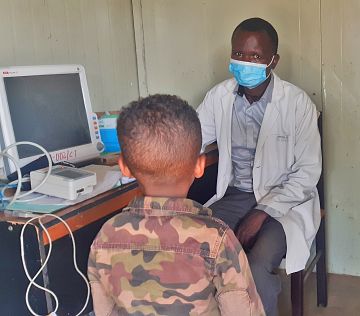Improving neglected tropical disease services and integration into primary healthcare in Ethiopia
29 January 2022
Results from a research study conducted by Malaria Consortium to improve the integration of neglected tropical disease (NTD) services into primary healthcare in Ethiopia show improvements in the capacity of primary healthcare to detect, manage and record NTDs as well as an increased awareness and improved integration of NTDs more generally into primary healthcare settings.
NTDs — the collective name for a group of parasitic and bacterial infectious diseases — affect up to one and a half billion people worldwide with 40 percent of cases occurring in sub-Saharan Africa. They disproportionately impact the most vulnerable and marginalised communities and limit the economic and social potential of those affected.
To date, global NTD interventions have focused primarily on mass drug administration. The World Health Organization’s most recent NTD roadmap (2021–2030) however calls for greater integration and mainstreaming of NTD approaches into national health systems; more coordinated, cross-sectoral action; and further operational and implementation research — including community-based and applied research.
Ethiopia has one of the highest NTD burdens in Africa. To support the Ethiopian Government to tackle this and work towards achieving the strategic objectives outlined in Ethiopia’s NTD Map, Malaria Consortium undertook a research study to explore the feasibility, acceptability and cost effectiveness of integrating the prevention, diagnosis, management and reporting interventions of three common NTDs — lymphatic filariasis, schistosomiasis and trachoma — into Ethiopia’s primary healthcare system, with a similar study focusing on Podoconiosis also being implemented concurrently.
“This study, led by Malaria Consortium, gives added value to our NTD programme, the evidence that has been generated from this undertaking will inform NTD strategies not only across the SNNPR but also across other regions and we are committed to taking recommendations forward to the next appropriate steps,” said Mr Fikre Seif, National NTDs Program Team Leader, Ethiopia Federal Ministry of Health
The study took place between December 2019 and January 2022 in Damot Gale, Wolaita zone, Southern Nations, Nationalities, and People’s Region (SNNPR) across one primary hospital, one health centre and five health posts. After initial assessments to ascertain current health system capacity, service provision and care-seeking behaviour for NTDs, a number of activities were implemented including: job aids for staff at different levels of the primary healthcare system; creating clear and harmonised NTD case definitions with additional indicators for suspected targeted NTD cases; introduction of sensitive tests for intestinal schistosomiasis detection; provision of drugs and medical supplies to assist routine case management; inclusion of NTD supervision tool into routine supervision; integrated NTD training facilitators guide and training of health workers.
Data collected on target NTDs before and after the intervention showed improvements in the capacity of primary healthcare to detect, manage and record NTDs, an increased awareness and improved integration of NTDs more generally into primary healthcare settings and significant improvements in the use of intervention materials by health workers and health extension workers as intended with patients and caregivers satisfied with the healthcare service provided.
Key stakeholders, including representatives from Ethiopia’s Ministry of Health, recently met to hear full findings from the study and to discuss recommendations and next steps.
Dr Kevin Baker, Senior Research Advisor at Malaria Consortium said, “Given the important and encouraging findings our study has reported, with improved care seeking behaviours demonstrated for NTDs at primary healthcare units in Ethiopia, we would look to further test our intervention in a large-scale implementation evaluation as the next step before scaling up.”
Related content
24 April 2020
Improving neglected tropical disease (NTD) services and integrating into primary healthcare
1 May 2021Photo story: Improving neglected tropical disease (NTD) services in Ethiopia
Latest news
- Malaria Consortium honoured by Ugandan government for contribution to combat malaria23rd April 2024
- International summit calls for AMR accountability in public health interventions21st March 2024
- Global SMC community celebrates new milestone at SMC Alliance Annual Meeting in Nigeria6th March 2024
- Scaling up key interventions could halve pneumonia-related childhood mortality13th February 2024
- Malaria Consortium and eGov Foundation join Mozambique’s national malaria programme to digitalise seasonal malaria chemoprevention campaigns8th February 2024
- World’s first malaria vaccine rollout launched in Cameroon22nd January 2024